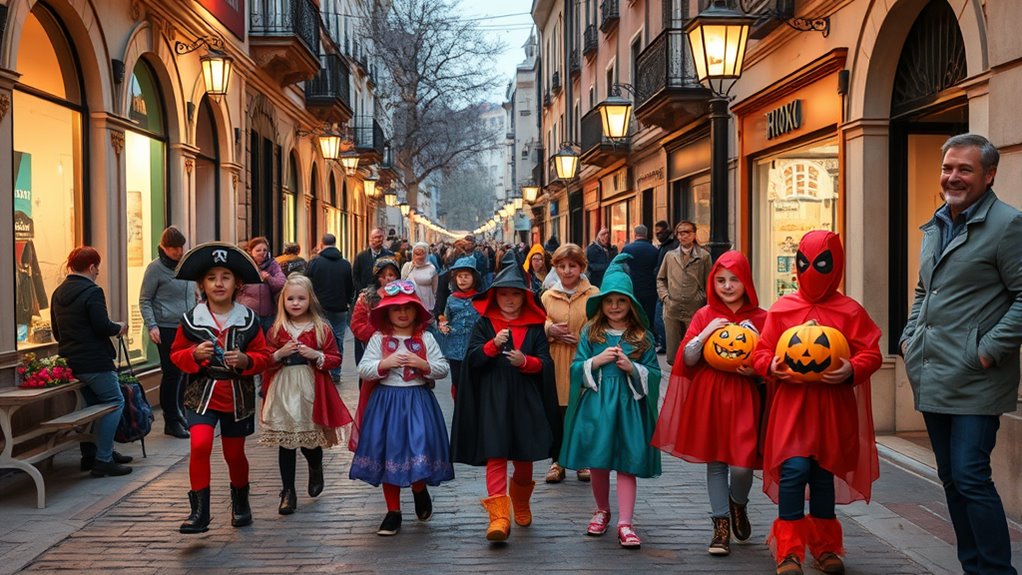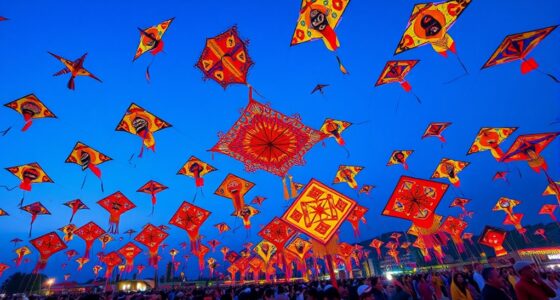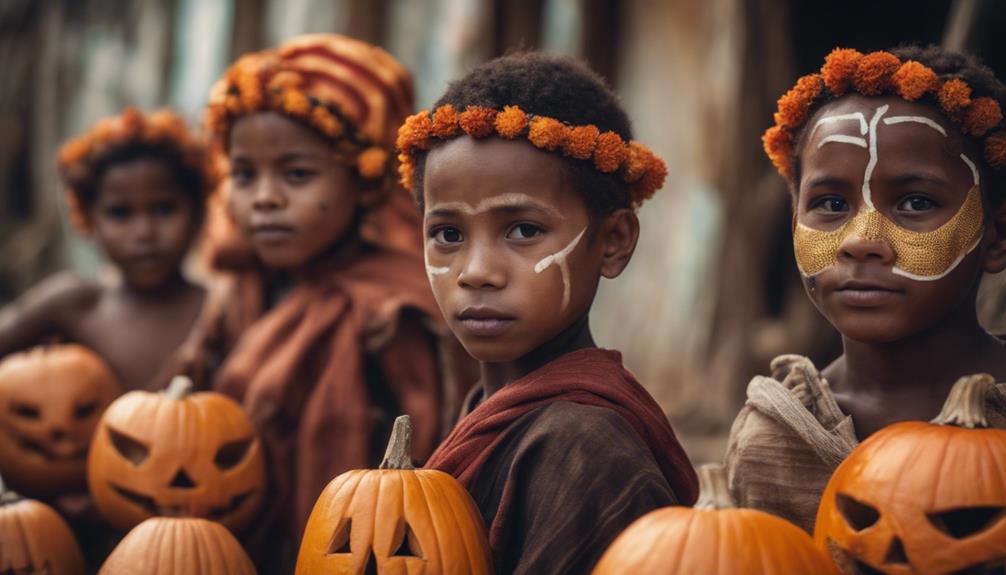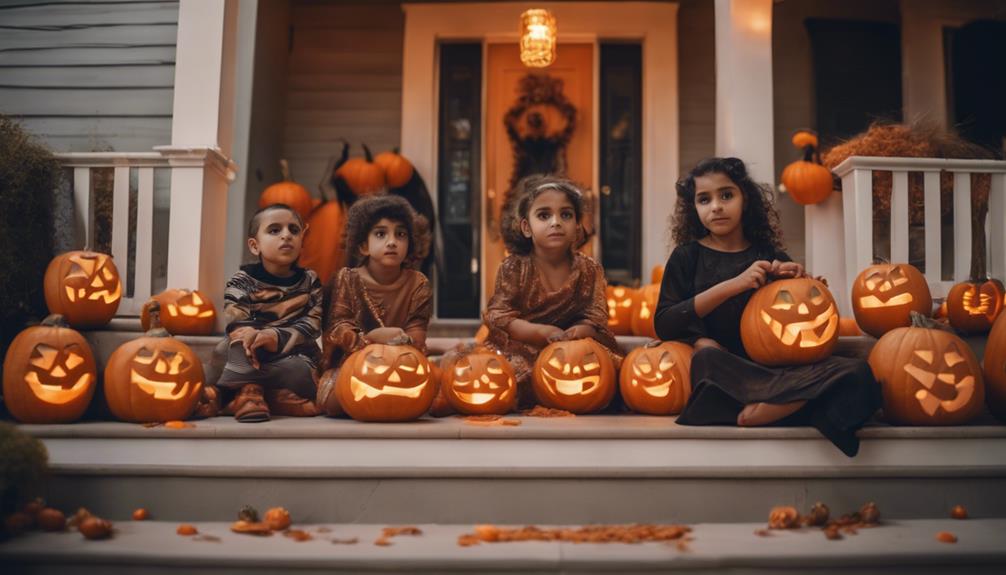In Turkey, Halloween is a lively, secular celebration that merges Western customs with local cultural elements. You’ll see young people and children dressing up, carving pumpkins, and enjoying themed parties, reflecting a broader trend of cultural integration. The holiday emphasizes fun rather than religious meaning, fitting well with Turkey’s diverse population. Shops, schools, and communities embrace these festivities as part of a modern, multicultural society—exploring further reveals how these traditions adapt and flourish within Turkey’s unique context.
Key Takeaways
- Halloween is increasingly popular among Turkish youth, emphasizing fun, costumes, and community activities rather than religious significance.
- The holiday reflects a blend of Western traditions with local customs, creating a unique, hybrid celebration.
- Secular values promote inclusive events, allowing diverse communities to participate without religious conflict.
- Commercial and educational sectors incorporate Halloween themes, fostering cultural exploration and social cohesion.
- Halloween exemplifies Turkey’s ability to adapt external cultural practices within its secular, multicultural society.

In Turkey, Halloween has become an increasingly popular celebration, even within a historically Muslim society that emphasizes secularism. You might notice that more people, especially young adults and children, are donning costumes, carving pumpkins, and attending themed parties. This growing trend reflects a broader process of cultural integration, where Western customs blend with local traditions, creating a unique, hybrid way to observe the holiday. For many Turks, Halloween is less about religious origins and more about fun, community, and entertainment. It’s a chance to participate in a festive event that encourages creativity and social interaction, regardless of religious background.
Halloween in Turkey blends Western traditions with local culture, focusing on fun and community over religious significance.
The diverse makeup of Turkey’s population plays a significant role in how Halloween is perceived and celebrated. Religious diversity, in particular, influences the holiday’s acceptance and adaptation. While Turkey is mainly Muslim, it also hosts Christian and Jewish communities, along with secular individuals who see Halloween as a cultural phenomenon rather than a religious one. This openness allows for a broader interpretation of the holiday, where it’s seen as an opportunity to express individuality and enjoy seasonal festivities without conflicting with religious beliefs. As a result, Halloween parties often feature a mix of themes—from spooky costumes to pop culture references—highlighting the country’s pluralistic society.
You might also observe that some people approach Halloween with a sense of curiosity or even skepticism, questioning its relevance in a Muslim-majority country. However, many embrace it as a harmless, enjoyable event that promotes social cohesion. Shops and malls increasingly display Halloween-themed decorations and sell costumes, signaling a commercial dimension that appeals to a wide audience. Schools sometimes organize costume contests or thematic activities, encouraging students to explore different cultural practices while fostering an environment of inclusivity. This approach aligns with Turkey’s secular principles, which support the coexistence of diverse cultural expressions within a shared national identity. Additionally, the secular nature of the society helps to facilitate the acceptance of such multicultural celebrations, allowing them to flourish without religious conflicts.
Ultimately, Halloween in Turkey isn’t just about costumes and candy; it’s a reflection of how a society can adapt an external cultural practice without undermining its core religious or secular values. It illustrates the country’s capacity for cultural integration, where traditions from different parts of the world are woven into the local fabric. As you witness this holiday unfold, you see how religious diversity and secularism work hand in hand to create an environment where new customs are welcomed and celebrated, enriching Turkey’s vibrant cultural landscape.
Frequently Asked Questions
How Do Turkish Muslims Perceive Halloween Celebrations?
You might find that many Turkish Muslims see Halloween as a fun, cultural event rather than a religious celebration. Some appreciate the opportunity for cultural integration, enjoying costumes and parties with friends. Others may have religious perspectives that view Halloween as conflicting with Islamic values, leading to mixed reactions. Overall, perceptions vary widely, with some embracing it as a secular tradition, while others prefer to keep their religious and cultural practices separate.
Are Halloween Costumes Culturally Appropriate in Turkey?
Imagine you’re planning a Halloween costume in Turkey. While some see it as fun, you should consider cultural sensitivities. In Turkey, costume appropriateness varies, and what’s fun in the West might offend others here. You might think about costumes that respect local traditions. Respecting cultural sensitivities helps you avoid misunderstandings, ensuring your Halloween celebration is enjoyable and culturally appropriate. Being mindful makes your experience both fun and respectful.
How Do Schools Incorporate Halloween Into Their Curriculum?
You’ll find that schools incorporate Halloween into their curriculum through cultural integration and creative educational strategies. Teachers often organize themed activities, such as crafts, storytelling, and history lessons, to introduce students to Halloween traditions. These activities aim to promote cultural understanding and inclusivity, allowing students to learn about different customs while fostering a fun, engaging learning environment. You’re encouraged to participate actively in these celebrations to enhance your cultural awareness.
What Is the History of Halloween’s Popularity in Turkey?
You might find that Halloween’s popularity in Turkey has grown through historical influences and cultural adaptations. Originally, it wasn’t celebrated, but Western media and global trends introduced it in the late 20th century. As Turks adapted these festivities, they blended them with local customs, making Halloween more popular among youth and urban populations. This evolving cultural landscape shows how global influences shape local traditions, even in secular societies.
Do Turkish Authorities Regulate Halloween Festivities?
Did you know that around 30% of Turkish youth participate in Halloween festivities? Turkish authorities generally don’t heavily regulate these celebrations, viewing them as part of cultural exchange and international influence. While some officials see Halloween as a secular, fun event, others worry about it impacting traditional values. Overall, the government tends to allow festivities, recognizing their role in fostering global connections without strict regulation.
Conclusion
As Halloween whispers through Turkey’s streets like a gentle breeze, it’s as if a colorful lantern flickers in a night sky, illuminating the blend of tradition and modernity. You see the moon’s soft glow guiding curious souls, bridging worlds with a playful dance of shadows. In this secular society, Halloween becomes a delicate tapestry of shared stories, where even the quietest star finds its place, shining brightly amidst the tapestry of Turkey’s evolving cultural landscape.









